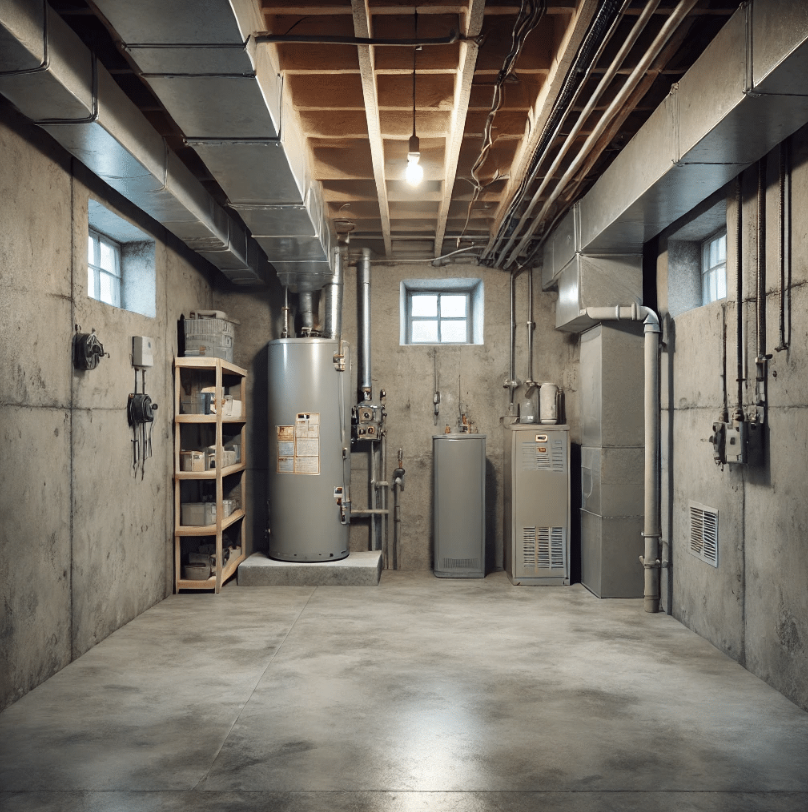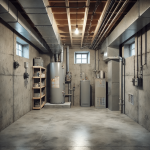When it comes to finding the best waterproofing for your concrete walls, you’re spoilt for choice. From Drylok Extreme Waterproofer’s mildew-resistant, latex-based solution to the deep penetrating properties of RadonSeal Plus, and the seamless protection of Ames Blue Max Liquid Rubber, each offers unique benefits. Now, you may ask, “Which one is right for me?” Well, that depends on the specific environmental challenges your structure faces. But don’t worry, we’re about to explore that conversation, helping you make the best choice for your concrete walls.
Key Takeaways
- Drylok Extreme Waterproofer is a user-friendly, latex-based product that is also resistant to mildew.
- RadonSeal Plus is a deep-penetrating silicate sealer effective for blocking both radon and water.
- Ames Blue Max Liquid Rubber offers a seamless, UV-resistant, and flexible water barrier.
- Damtite Waterproofing Hydraulic Cement is fast-setting and ideal for quick leak repairs.
- Behr Premium Waterproofing provides a durable finish with long-lasting protection on concrete walls.
Understanding Concrete Wall Waterproofing
When it comes to waterproofing your concrete walls, understanding the process and its importance is key. Waterproofing isn’t just about applying a sealant and hoping for the best. It’s a meticulous process that entails careful preparation, precise application, and ongoing maintenance.
The first thing you need to be aware of is the condition of your concrete walls. Any existing damage or cracks must be repaired before the waterproofing process can begin. You can’t just slap a coat of waterproofing material over a damaged wall and expect it to last.
Next, you should know that there are different types of waterproofing materials available, and the choice depends on several factors including the level of water exposure and the location of your walls. Some materials might be better suited for basement walls, while others might be ideal for exterior walls.
Lastly, remember that waterproofing isn’t a one-time process. You’ll need to regularly inspect your walls and reapply the waterproofing material as necessary to guarantee long-term protection. It’s a small investment of time and effort, but it’ll save you a lot of trouble down the line.
Benefits of Waterproofing Concrete Walls
Investing in the waterproofing of your concrete walls yields numerous benefits, both immediate and long term. Waterproofing not only protects the walls from damage caused by water ingress, but it also extends the life of the concrete, saving you replacement costs down the road.
One notable advantage is the improved resilience of your concrete walls against the detrimental effects of moisture. Waterproofing provides a barrier against water penetration, guarding against mold, mildew, and deterioration. This benefit alone can lead to substantial savings in maintenance and repair costs.
Moreover, waterproofing can considerably enhance the overall appearance of your concrete walls. It prevents staining and discoloration, maintaining the aesthetic appeal of your property.
Let’s summarize these benefits in the following table:
| Benefits of Waterproofing | Description |
| Improved Resilience | Waterproofing provides a barrier against water penetration, guarding against mold, mildew, and deterioration. |
| Cost Savings | Waterproofing can lead to substantial savings in maintenance, repair, and replacement costs. |
| Enhanced Appearance | Waterproofing prevents staining and discoloration, maintaining the aesthetic appeal of your property. |
Top Waterproofing Products for Concrete
You’re faced with a myriad of choices when it comes to waterproofing your concrete walls.
Let’s explore some of the top products that’ll put an end to your search.
First off, there’s the Drylok Extreme Waterproofer. It’s a latex-based product that’s easy to apply, doesn’t emit harsh odors, and resists mildew growth.
It’s a versatile choice, suitable for both interior and exterior walls.
Next, we’ve the RadonSeal Plus Deep-Penetrating Concrete Sealer. It’s a water-based silicate sealer known for penetrating and reacting chemically within the concrete pores, blocking radon, water, and vapor effectively.
Another top contender is the Ames Blue Max Liquid Rubber. This high-strength elastomeric liquid provides a seamless, flexible, and impervious barrier against water.
It’s also UV resistant, enhancing longevity.
Lastly, consider the Damtite Waterproofing Hydraulic Cement. It’s a fast-setting patching material, perfect for plugging leaks instantly.
Applying Waterproofing Techniques Effectively
Mastering the art of waterproofing is no small feat. To do it effectively, you need to be methodical, patient, and attentive to details. First, you must verify that the concrete surface is clean and free from any loose particles. You can do this by power washing it or scrubbing it with a wire brush.
Next, you need to apply the waterproofing product. It’s essential to follow the manufacturer’s instructions to the letter. This might mean applying multiple coats, or it might require a specific drying time between applications.
Lastly, you should always test the waterproofing to confirm it’s working. You can do this by pouring a small amount of water on the surface and observing whether it beads up or seeps in.
Here’s a simple table to help visualize the process:
| Steps | Description |
| Clean | Power wash or scrub the surface |
| Apply | Follow the manufacturer’s instructions |
| Test | Pour water on the surface and observe |
Maintaining Your Waterproofed Concrete Walls
Once your concrete walls are waterproofed, their long-term performance largely depends on regular maintenance. You can’t just apply a waterproofing agent and forget about it. There’s a need for continuous care to guarantee the waterproofing lasts and continues to protect your walls from moisture damage.
So, how do you maintain your waterproofed walls? First, clean them regularly. Dirt and debris can break down the waterproofing over time. Use a mild detergent and a soft brush to gently clean the surface without damaging the waterproof layer.
Second, conduct routine inspections, especially after heavy rains or in damp weather. Look for signs of moisture seepage, such as damp spots, mold, or peeling paint. If you spot any of these, it might indicate a failure in the waterproofing that needs immediate attention.
Additionally, monitor for cracks. Even minor ones can let in water, compromising the waterproofing. If you find cracks, repair them as soon as possible using a waterproof filler or sealant.
Frequently Asked Questions
How Much Does It Typically Cost to Waterproof Concrete Walls?
The cost to waterproof concrete walls varies depending on several factors.
You’ll need to take into account the size of the area, the type of waterproofing method used, and labor costs in your region.
Typically, it can range anywhere from $3 to $9 per square foot.
However, for a more accurate estimate, you’d need to get quotes from local contractors, as they’d factor in unique elements of your project.
Are There Any Eco-Friendly Options for Waterproofing Concrete Walls?
Yes, there are eco-friendly options for waterproofing your concrete walls. You might consider a silicate-based concrete sealer, also known as a densifier.
It’s not only eco-friendly but also penetrates deeply into your concrete, making it resistant to water damage. They’re safe, non-toxic, and don’t contribute to VOC emissions.
However, remember they’re only suitable for unsealed and unpainted concrete. Also, they permanently change the concrete’s surface, so test it on a small area first.
How Long Does the Waterproofing Process Usually Take?
Typically, the waterproofing process doesn’t take too long.
Once you’ve prepped your wall, applying the waterproofing product might take a day or two, depending on the size of the area.
Then, you’ll need to let it dry. That’s usually a few days, but it can vary based on the product and weather conditions.
So, you’re looking at about a week, all told.
Of course, this is a general estimate. It could be shorter or longer for your specific project.
Can Waterproofing Be Applied to Already Painted Concrete Walls?
Yes, you can apply waterproofing to already painted concrete walls.
However, it’s not as straightforward as you might think. You’ll need to carefully prep the surface first.
This means you’ll have to remove the existing paint, clean the wall thoroughly, and let it dry.
Only then can you apply the waterproofing.
It’s a bit of a hassle, but it’s necessary to guarantee the waterproofing adheres properly and provides effective protection.
Are There Any Potential Hazards or Risks Associated With Waterproofing Concrete Walls?
Yes, there are potential risks. If you’re not careful, you might trap moisture in the concrete, leading to mold growth.
Also, improper application can result in an uneven surface or bubbles. It’s crucial to prepare the surface correctly and apply the waterproofing properly.
Conclusion
In the end, it’s all about your specific needs. Whether you choose Drylok’s mildew-resistant solution, RadonSeal’s deep-penetrating treatment, or Ames Blue Max for seamless protection, the best waterproofing for your concrete walls should be tailored to your unique environmental conditions. Remember, effective application and ongoing maintenance are key. This isn’t just about making your walls waterproof, it’s about ensuring they stand up to the test of time.



